
UoB emailed the institution’s plan to increase diversity, decolonise its modules and improve inclusivity
On the 3rd June, the University of Birmingham (UoB) released a statement regarding their ‘commit[ment] to creating and maintaining an inclusive learning and working environment’ as part of their plan to tackle racism.
UoB has since announced, in an email to staff and students that it has submitted an application to the Race Equality Charter which includes an action plan to tackle racism in light of the recent Black Lives Matter protests.
The Race Equality Charter (REC) is a service provided by Advance HE, an organisation dedicated to helping higher education shape its future. The REC seeks to provide a framework through which institutions work to self-reflect on institutional and cultural barriers standing in the way of minority ethnic staff and students.
UoB’s Access and Participation plan includes a commitment to the following: ‘to tackle racial literacy; enhance inclusive practice in teaching and learning; improve access for students from BAME backgrounds and reduce the BAME attainment gap.’
It also includes ‘actions to decolonise and diversify curriculum content and library collections; actions to reduce the ethnicity pay gap; improve BAME staff representation within the organisation, and embedding equality in our structures and governance.’
Unions and campaigners accus[ed] [the University] of pursuing draconian and discriminatory monitoring of non-EU academics
The BAME (Black, Asian, and Minority Ethnic) attainment gap refers to the disparity between the number of first class and 2:1 degrees awarded to white and BAME students. In the 2019/2020 academic year, UoB’s Access plan reported that ‘we have made significant gains in reducing the BAME attainment gap’ as it has been reduced from 21.6% in 2011 to 10.3% in 2019.
Individual schools within UoB have also laid out their own plans. The Head of the School of History and Cultures Dr Sabine Lee, stated that the school is committed to ‘addressing our curricula to diversify and decolonise it,’ stating that ‘thus far, we have made significant progress in decolonising the curricula.’ To ‘decolonise,’ universities must aim to provide more representation of non-European writers, thinkers, historians, and topics, as many institutions have been criticised for teaching a ‘Eurocentric’ curriculum.
Dr Meera Sabaratnam, a lecturer in the School of Oriental and African Studies at the University of London, said that through decolonising curriculums, staff and students are ‘ask[ed] to look at [their] shared assumptions about how the world is […] [as] such assumptions also informed and justified the expansion of colonial rule in Africa, Asia, and the Middle East until the mid-twentieth century.’
UoB stated in their email that in 2019, their ‘largest ever consultative exercise with more than 5000 staff and students having conversations about race’ was undertaken.
Following this, UoB was criticised for its plans to enforce immigration controls more strictly for international and non-EU members of staff. The Guardian reported last year that ‘unions and campaigners accus[ed] [the University] of pursuing draconian and discriminatory monitoring of non-EU academics.’
The article adds that Liberal Democrat MP Layla Moran described this decision as ‘another reminder of the cold shoulder that the UK is giving to the brightest talent from across the world.’

Comments